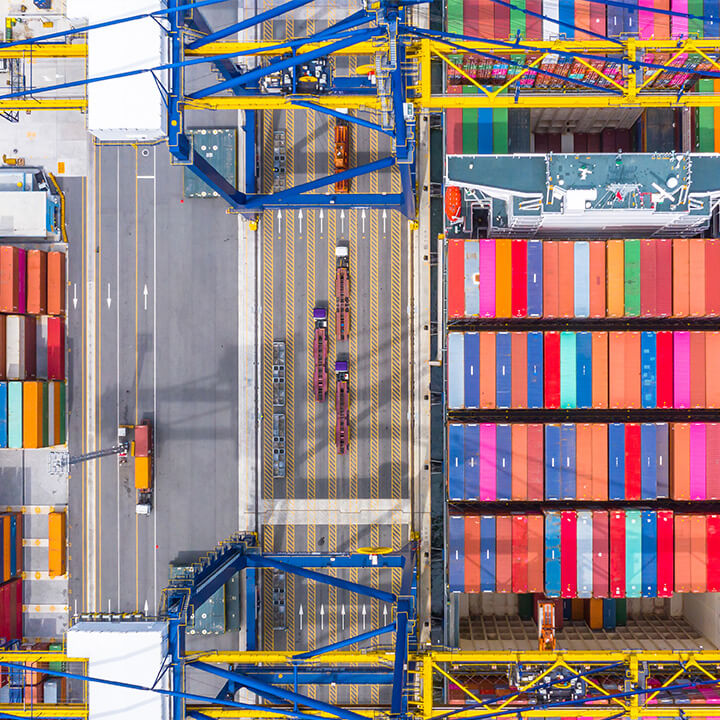Electronic Trade Documents Act to revolutionise international trade
7th September 2023
The Topline
“The new Electronic Trade Documents Act could truly revolutionise international trade, and puts the UK firmly at the forefront of developments. While there will be some initial transitional costs to businesses, the potential benefits are hugely significant. Using electronic trade documents instead of paper ones will not only increase efficiencies considerably, but will also play a major role in helping companies with their environmental targets and, particularly at a time of geopolitical tension and uncertainty, with concerns around security, fraud and supply chain transparency.“
– Andrew Northage, Partner, Regulatory & Compliance


What is the Electronic Trade Documents Act 2023?
The Electronic Trade Documents Act 2023 was passed following recommendations by the Law Commission, part of its wider work on digital assets. The new law comes into force on 20 September 2023.
Moving goods around the world is a hugely complex operation, involving many different parties and a multitude of documentation. According to this House of Commons Library Research Briefing, it’s estimated that 25 billion paper documents are created globally each year to facilitate international container shipping. A key reason for this is that the current system in various jurisdictions is based on centuries-old laws and practices which centre on ‘possession’ of certain trade documents such as bills of lading and bills of exchange.
The major sticking point, in an increasingly digitalised world where sustainability matters, is that electronic documents can’t be ‘possessed’ by law. The Electronic Trade Documents Act 2023 changes that, giving electronic trade documents the same legal status and functionality as paper ones, and placing the UK at the forefront of a digital trade revolution.
It’s important to note that the Act doesn’t mandate the use of electronic trade documents – it gives businesses the choice.
What documents does the Act cover?
To be able to define “electronic trade document”, the Act first explains what comprises a “paper trade document”:
- it’s in paper form;
- it’s a document of a type commonly used in at least one part of the UK in connection with trade in or transport of goods, or financing such trade or transport; and
- possession of the document is required as a matter of law or commercial custom, usage or practice for a person to claim performance of an obligation.
Examples include: bills of exchange; promissory notes; bills of lading; ship’s delivery orders; warehouse receipts; mate’s receipts; marine insurance policies; and cargo insurance certificates.
Documents used in the money markets, such as bearer bonds, wouldn’t fall within the definition.
For a document in electronic form to constitute an “electronic trade document” for the purposes of the Act it needs to satisfy the following criteria:
- It must contain the same information as would be required in the paper equivalent.
- The information, together with any other information with which it’s logically associated and which is also in electronic form, constitutes an “electronic trade document” if a reliable system is used to:
- identify the document so that it can be distinguished from any copies,
- protect the document against unauthorised alteration,
- secure that it’s not possible for more than one person to exercise control of the document at any one time,
- allow any person who is able to exercise control of the document to demonstrate that the person is able to do so, and
- secure that a transfer of the document will deprive any person, who was able to exercise control of the document immediately before the transfer, of the ability to do so.
The Act goes on to explain what “control” means and sets out a list of matters that may be taken into account in determining whether a system is “reliable”.
There are also provisions dealing with converting a paper trade document into an electronic one, and vice versa.
The Act won’t apply to paper or electronic trade documents issued before 20 September 2023.
Electronic Trade Documents Act: The impact on businesses
In its press release, the government said the changes brought about by the Act were estimated to add over £1 billion to the British economy over the next decade by making trade more straightforward, efficient and sustainable. And in its
final report summary, the Law Commission cited significantly lower resourcing and operational costs, increased efficiency, increased transparency, increased security, reduced errors, environmental benefits, greater resilience to the impact of sudden shocks such as COVID-19, and the potential for reducing or eliminating fraud.
The Law Commission also acknowledged that there will be some costs to businesses. For example, training staff on new systems, developing and refining new internal processes, and spending time negotiating with trading partners.
In terms of what constitutes a “reliable system”, the Commission decided against recommending separate provision in the Act for an accreditation process. There may be a period of uncertainty until there is some industry guidance or court rulings on this point. In the meantime, businesses should adhere to the non-exhaustive list of matters set out in the Act and make sure, as a matter of course, that their contractual arrangements adequately address issues of security and liability.
While the Law Commission referred in its report to systems based on distributed ledger technology (DLT) [1], it recognised that not all systems hosting trade documents in electronic form are DLT-based, nor do they need to be to satisfy the criteria for electronic trade documents set out in the Act.
The Act only applies here in the UK, but crucially, as the Law Commission notes, the law of England and Wales currently enjoys a preeminent status as the law of choice in global commerce, underpinning a significant amount of international trade. In developing these reforms, the Commission was mindful of other initiatives, in particular the UNCITRAL Model Law on Electronic Transferable Records.
Electronic Trade Documents Act: How we can support you
Andrew is part of our team of multi-disciplinary international trade lawyers. Please get in touch if you have any queries about the new Act, or need advice or assistance with implementing new systems, staff training, contract review or negotiation.
Click here to find out more about our supply chain services.
Our Environment team is on hand to help with any questions around environmental targets and reporting and sustainability agendas.
Our latest GC report looks at how in-house legal teams are equipping themselves for digital transformation. Please contact one of our Technology & Digital experts to discuss how we can support you. Click here to receive our regular Technology & Digital round-up and other similar updates direct to your inbox.
[1] Distributed ledger technology describes a wide range of technologies such as blockchain that maintain immutable digital records across a network. It’s considered to have far-reaching potential across a wide range of sectors.









